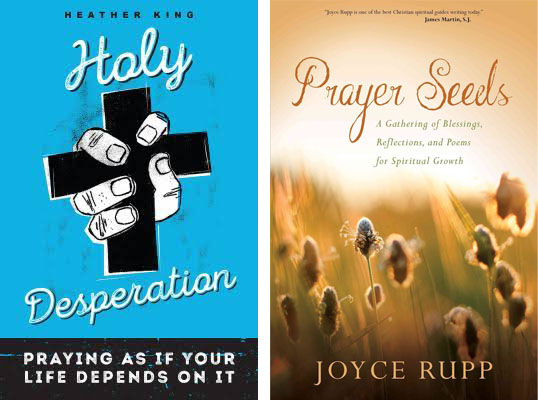 “Holy Desperation: Praying as if Your Life Depends on It”
“Holy Desperation: Praying as if Your Life Depends on It”
by Heather King.
Loyola Press (Chicago, 2017).
224 pp., $13.95.
“Prayer Seeds: A Gathering of Blessings, Reflections and Poems for Spiritual Growth”
by Joyce Rupp. Sorin Books
(Notre Dame, Indiana, 2017).
205 pp., $15.95.
Heather King is a wonderful writer who, in “Holy Desperation,” gives us a contemporary rendition of classic Catholic asceticism.
Her story — a recovering alcoholic who gave up the practice of law to embark on a full-time vocation as a writer — would be compelling enough as a human memoir. But what she has done in this remarkable book is more impressive. King, who entered the church in 1996, has allowed us to see the contours of her prayer life and the daily discipline that led her to a life of service.
[hotblock]
The book begins with the prayer of desperation King uttered from the depths of 20 years of alcoholism, an acknowledgment of defeat and the utter need for God’s help. The kernel of her wisdom is the recognition that “genuine spiritual awakening seems to consist in a disappearance, however temporary, of self.”
This insight, rare among contemporary spiritual writers, is what makes her an authentic practitioner of prayer. “I began to see that the purpose of a relationship with God, of prayer, wasn’t to ‘be good.’ It was to help out.”
King, a faithful and involved Catholic, attends daily Mass, regularly receives the sacrament of reconciliation and has a profound sense of belonging to the mystical body of Christ. Hers is a remarkable (because rare) corporate understanding of Catholicism.
“I’ve tried to remain faithful to her teachings, on sex, and on everything else. I’ve stumbled; I’ve failed, but one thing this has given me is some rough purity of heart. I go to confession because I believe that what we do and think matters. I go because I believe someone, somewhere, needs me to pure. Maybe it’s the father of a 10-year-old girl who is contemplating molesting her. Maybe it’s an adult who was abused by a priest as a kid and is about to abuse his own kid.”
King avails herself of the rich storehouse that is the church’s wisdom on prayer: the Divine Office, adoration, the Jesus prayer, the Ignatian “examen,” “lectio divina” and silence. Throughout the book she offers examples from her life that give further reasons to trust her witness: how she structures her days, times when she is able to hold her tongue, and times when she is not.
“The goal of prayer … is not calm. It is not equanimity. The life of prayer is not about ‘balance,'” she writes. Rather, “prayer consists in an utter surrender to God’s will and an offering of our entire selves to his service.” Because she shows us what this looks like in one ordinary life she gives us courage to take up our own cross and follow the wounded Christ.
The bracing reality of King’s writing is in sharp contrast to the diffuse offerings in “Prayer Seeds” by Sister Joyce Rupp, O.S.M. Admittedly these books are written for different audiences. King writes for the individual whereas Sister Rupp’s collection of blessings and prayers are appropriate for prayer groups, communal retreats or gatherings as well as individual meditation.
[hotblock2]
“Prayer Seeds” includes guided reflections, selections from poetry and prose, prayers for liturgical seasons and feasts, for times of transition and remembrance, of grief and joy.
Many of Sister Rupp’s meditations will appeal to people who are spiritual but not religious: prayers are addressed, at various times, to the Divine Mother, Compassionate One, Divine Guest, Holy Mystery, Holy One Dwelling Within Me, Kindhearted Holy One and All-Encompassing Heart. The writing is frequently sentimental and romanticized.
Certainly there are times when we all need comfort, affirmation and compassionate support, but this is an insufficient basis for a spiritual life. There is no hint in these pages of what Heather King knows and what tradition teaches: “Our prayer must always point to God, not to ourselves.” “Prayer Seeds” is disappointing precisely because it points to ourselves and not to God.
***
Linner, a freelance writer and reviewer, has a master’s in theology from Weston Jesuit School of Theology.
PREVIOUS: ‘Leap!’ puts exclamation point on chasing your dreams
NEXT: Immigrants raise a dying parish to new life in ‘All Saints’


Share this story